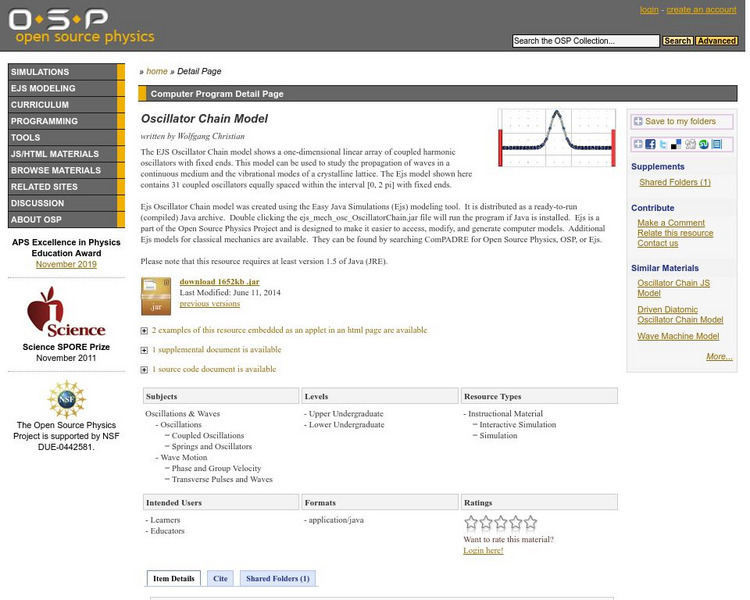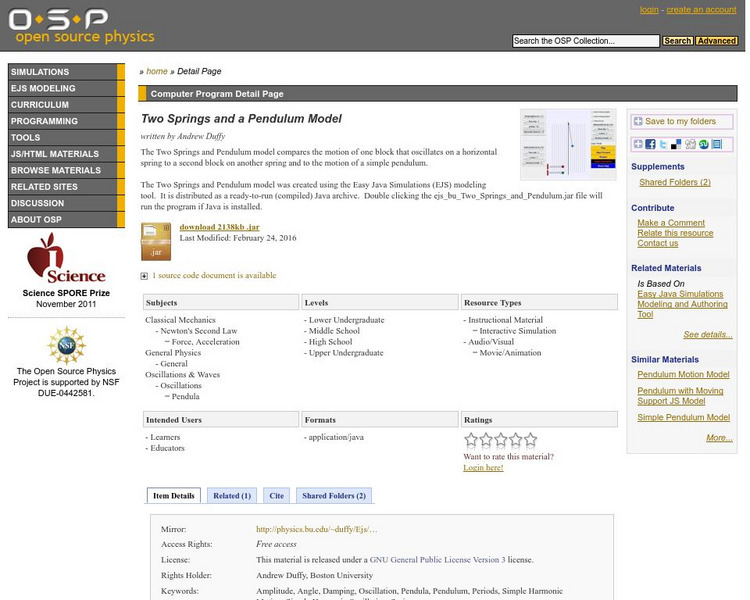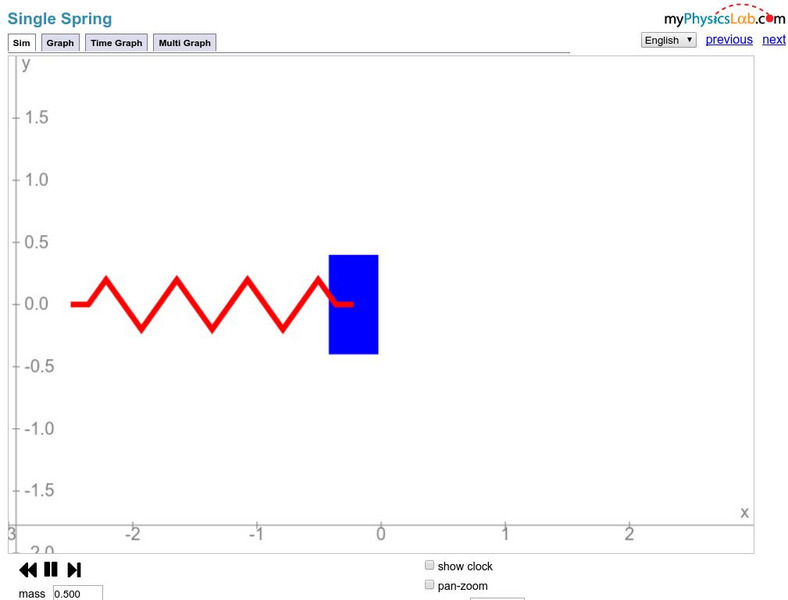Curated OER
Protecting Treasures
Students explore electricity by creating an alarm. In this circuitry instructional activity, students analyze a diagram of a circuit based alarm which detects sunlight. Students utilize electrical equipment to recreate the circuit and...
Curated OER
Simple Harmonic Motion
Students explain the theory of simple harmonic motion (SHM) by performing hands-on, practical application experiments.
Curated OER
The Sine Function
Young scholars explore the concept of the sine function. In this sine function activity, students use a plexiglass sine wave generator to visualize the sine function. Young scholars use a computer program/calculator to adjust aspects of...
Curated OER
Swinging on a String
Students explore how pendulums work and why they are useful in everyday applications. In a hands-on activity, they experiment with string length, pendulum weight and angle of release.
Curated OER
Which Wrap Is Wrapped Right?
Young scholars investigate the integrity and strength of different types of food wraps. They test the wraps and create a graphic organizer for the data. Once it is organized then a lab report can be written. The lesson plan contains...
American Association of Physics Teachers
Com Padre Digital Library: Open Source Physics: Chaotic Electric Circuit Explorer
Simulation investigating the characteristics of two electrical circuits that exhibit chaotic behavior, Chua's circuit and an autonomous relaxation oscillator (ARO), by adjusting the settings.
American Association of Physics Teachers
Com Padre Digital Library: Open Source Physics: Oscillator Chain Model
In this simulation a series of coupled oscillators in a chain with anchored ends can be investigated for their wave properties.
Society for Science and the Public
Science News for Students: Wet Dog Physics
Describes the physics behind animals' ability to dry themselves by shaking to remove water.
University of New South Wales (Australia)
University of New South Wales: School of Physics: Physclips: Oscillations
Physiclips thoroughly presents wave and sound concepts about oscillations with animations and film clips.
Concord Consortium
Concord Consortium: Molecular Workbench Showcase: Physics, Quantum Physics
A collection of simulations to show the important topics of quantum physics.
Nobel Media AB
The Nobel Prize: The Nobel Prize in Physics 1905
This Nobel E-Museum website commemorates the work of Philipp von Lenard and his Nobel prize achievement. This detailed resource includes a biography, Lenard's Nobel Lecture, and the "The Nobel Prize in Physics 1905 Presentation Speech."
Massachusetts Institute of Technology
Mit: Open Course Ware: Courses: Physics Ii: Electricity and Magnetism
College-level physics course highlighting electricity and magnetism. This course is divided into several modules including electric fields, magnetic fields, electromagnetic forces, conductors and dielectrics, electromagnetic waves, and...
University of Colorado
University of Colorado: Physics 2000: More About Visualizing Electromagnetic Waves
Discusses the nature of an electromagnetic wave. Explains the oscillating electric field and represents it through clever graphics and animations.
American Association of Physics Teachers
Com Padre Digital Library: Open Source Physics: Two Springs and a Pendulum Model
Swing virtual pendulums and compare the motion of one oscillating weight on a horizontal spring to a second weight on another spring. Then, compare how these motions differ from the motion of a simple pendulum.
Other
My Physics Lab: Double Spring
Experiment with two springs that are connected to a wall to see what happens to the oscillation when you change the masses, spring stiffnesses, spring lengths or damping. Students can also change the starting position. Site includes...
Other
My Physics Lab: Single Spring
Experiment with a spring that is connected to a wall to see what happens to the oscillation when you change the mass, spring stiffness, or damping. Students can also change the starting position. Site includes equations to help students...
Other
Wikibooks: Physics Study Guide
A handy resource that gives an overview of equations and definitions pertinent to an introductory, college-level physics course, with two of its three sections focusing on motion-related topics and principles.
Georgia Department of Education
Ga Virtual Learning: Ap Physics 1: Simple Harmonic Motion
In this unit, students will discover the period of time of one oscillation, the frequency of oscillation, the object displacement, its velocity, and its acceleration. They will also discover how to apply the principles of conservation of...
American Association of Physics Teachers
Com Padre Digital Library: Open Source Physics: Anisotropic Oscillator Model
In this simulation an object is attached to two strings under tension on opposite sides of it. The object's starting position and the strings' lengths can be altered. The path of the object when it is released is traced on an...
American Association of Physics Teachers
Com Padre Digital Library: Open Source Physics: Double Pendulum Phase Space Model
Adjust to conditions of a double pendulum model and observe the results in an accompanying graph.
American Association of Physics Teachers
Com Padre Digital Library: Open Source Physics: Swinging Atwood's Machine Model
Variation on the standard Atwood's Machine model, where one hanging mass swings like a pendulum and the other remains stationary. Manipulate the conditions and observe the results.
Physics Aviary
Physics Aviary: Practice Problems: Spring Constant From Oscillation
Students must calculate the spring constant of a spring based on the oscillation graph that is created by an oscillating mass.
Physics Aviary
Physics Aviary: Visualizing a Wave as a Line of Oscillating Objects
This program gives students a visual representation of a wave as a line of masses that are oscillating out of step. Each oscillating mass will affect the oscillation of the wave next to it.
Physics Aviary
Physics Aviary: Guided Oscillation Lab
This lab is designed to have students calibrate an oscillating spring. They will develop a calibration equation to relate the frequency of oscillation to the mass on the spring. They will then test their equation by determining the mass...





















